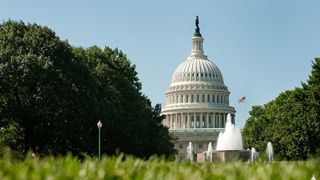'Net Neutrality' Remain Fighting Words on Hill

The House Communications Subcommittee Tuesday (March 12) arguably launched the next phase of the net neutrality fight, and fight it continues to be regardless of the talk from both sides about the bipartisan agreement that Congress needs to step in to clarify government internet oversight.
That came in a hearing Tuesday (March 12) on the Save the Internet Act, which Democrats introduced last week in the House and Senate. It would nullify the deregulatory Restoring Internet Freedom (RIF) order and restore the 2015 Open Internet Order and its rules against blocking, throttling, paid prioritization, and other conduct the FCC concludes would hurt an open internet.
It was the first legislative hearing in the Subcommittee in the new Congress, but the second net neutrality and clearly not the last.
Subcommittee chair Mike Doyle (D-Pa.) warned Republicans at the outset that the new bill was what they were dealing with at the hearing and that they could take up other topics at another time.
Somewhat ominously, House Energy & Commerce Committee chair Greg Walden (R-Ore.) began his statement for the hearing by asking Doyle about the ability to take action against witnesses who did not provide accurate testimony before the committee, even if they were not being required to take an oath--Doyle indicated there was such ability, though Walden likely knew the answer before he asked.
Rep. Doyle said that the bill's absolute prohibition on rate regulation and unbundling and other sections of common carrier regs the FCC had forborne in the 2015 Open Internet Order removes the majority of the Title II overhang that the bill's opponents have complained about in the past, so he suggested there should be less opposition on the other side.
That was not the case. Ranking member Bob Latta (R-Ohio) said he wasn't sure why they were holding the hearing so soon after a previous net neutrality hearing. He said that the hearing and its Title II-based bill will likely mean that folks will start digging in their heals and nothing will get done given that even some Democrats don't support Title II.
Broadcasting & Cable Newsletter
The smarter way to stay on top of broadcasting and cable industry. Sign up below
Walden said that while it was time for bipartisan legislation that could actually become law, but that the Save the Internet Act was not it. He said it will not become law. He said they could permanently ban blocking, throttling and paid prioritization without Title II.
House E&C chair Frank Pallone (D-N.J.) said the bill would return a cop to the beat at the FCC and prevent discriminatory practices, practices he said had been on the march since the FCC's Restoring Internet Order.
Free Press's Matt Wood illustrated why ISPs are concerned that even with the bill's prohibition on rate regulation, there could be de facto rate regulation via the general conduct standard. Asked by Doyle what sort of activities the FCC could get to via that standard that did not fall under the other rules, he said "price gouging." Asked by Latta, former FCC Commissioner Robert McDowell said he thought the FCC would effectively be able to set rates.
Related: Mozilla Says Net Neutrality Buck Stops at ISPs
Walden asked what crisis brought them to the hearing, saying it was certainly not all the edge provider abuses that had been coming to light over the past several months and years. He said they appeared to be there because House Speaker Nancy Pelosi (D-Calif.) still believed that ISPs were the threat. Pelosi co-sponsored the net neutrality legislation and spearheaded a press conference celebrating it last week. In the meantime, Walden pointed out, edge providers still get liability protections (Sec. 230 of the Communications Decency Act). He asked when the committee was going to start looking at those companies and their impact on the net, likely one of the "other topics" Doyle warned was not the subject of the hearing.
Both Doyle and Walden suggested they had open doors, but that neither had "wandered into" the others' office to talk about the issue before either side introduced their bills--three Republican bills, one Democratic. Doyle said he must have missed Walden's phone call before Republicans introduced their three bills "we didn't know about." That came after Walden suggested Doyle had not wanted to talk about potential bipartisan legislation.
Walden took issue with Woods' testimony attempting to undercut the argument from a Walden constituent and small broadband provider at a previous hearing, who argued that Title II had hurt his business. Walden asked if Woods had reached out to that witness before filing his testimony. Woods said no, and Walden expressed his disappointment, clarifying that this was the issue that drew his question about the consequences of inaccurate testimony.
Rep. Pete Olson (R-Tex.) put the finest point on the Republican view of the legislation: "This bill will die in the Senate. It's dead."
So, for all the talk, the bottom line remains that Republicans and Democrats still seem poles apart on "bipartisan" legislation, even as a federal appeals court in Washington prepares the latest legal pendulum swing with its decision on Mozilla et al.'s challenge to the Ajit Pai RIF order.
Contributing editor John Eggerton has been an editor and/or writer on media regulation, legislation and policy for over four decades, including covering the FCC, FTC, Congress, the major media trade associations, and the federal courts. In addition to Multichannel News and Broadcasting + Cable, his work has appeared in Radio World, TV Technology, TV Fax, This Week in Consumer Electronics, Variety and the Encyclopedia Britannica.

